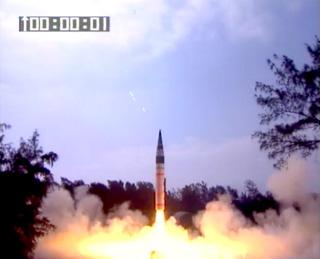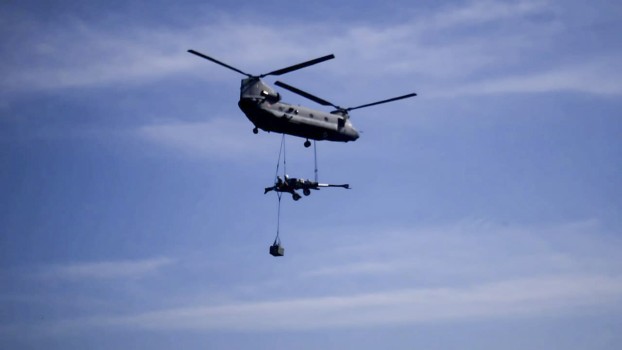
The Agni V ICBM is seen in this video grab during a successful launch from the Wheeler Island off Odisha coast near Dhamara on Thursday. Courtesy: DRDO.
DHAMARA, ODISHA (PTI): India on Thursday conducted successful test firing of its indigenously developed nuclear capable Agni-V ballistic missile with a strike range of over 5,000 km from a test range off Odisha coast.
"The mission was successful. The missile hit the target in Indian Ocean in a perfect way," Chief of Defence Research and Development Organisation (DRDO), V K Saraswat said.
The three stage solid propellant missile was test-fired from a mobile launcher from launch complex-4 of the Integrated Test Range (ITR) in Wheeler Island near here at about 0805 IST and took 15 minutes to reach its target in Southern Indian Ocean, defence sources said, describing the successful trial as a milestone in India's missile programme.
After the maiden launch, the Agni-V witnessed a smooth and perfect vertical lift-off from the launcher and thorough analysis was done to assess its health parametres after retrieval of data from all a wide range of sophisticated communication network systems, they said.
"The sleek missile, within a few seconds of its blast-off from the Island launch pad roared majestically into the sky leaving behind its a trajectory a trail of thin orange and white smoke before disappearing," said an eyewitness to the launch conducted amid light drizzling.
The test-fire of the first of its kind missile, which was originally scheduled to be held on Wednesday, had to be postponed at the last moment due to bad weather marked by rains and heavy lightning for safety reasons, sources said.
The successful trial of Agni-V, considered by many to be having the features of Inter-Continental Ballistic Missile (ICBM), demonstrated giant strides taken by India in its integrated missile development programme.
Only the United States, Russia, France and China possess the capability to operate an ICBM at present.
Prime Minister Manmohan Singh hailed the test firing of the missile saying that this represented another milestone in India's quest to add to the credibility of its security and preparedness.
"Today's successful Agni V test launch represents another milestone in our quest to add to the credibility of our security and preparedness and to continuously explore the frontiers of science.
"I congratulate all the scientific and technical personnel of the DRDO and other organisations who have worked tirelessly in our endeavour to strengthen the defence and security of our country," the Prime Minister said in his message.
The nation stands together in honouring the scientific community, he said.
Defence Minister A K Antony also described the maiden test flight of the missile as an "immaculate success" and a "major milestone".
"The nation stands tall today. We have joined the elite club of nations (to possess the ICBM capability)," Antony told DRDO Chief Dr V K Saraswat on phone after the test flight of the missile was declared successful.
"The immaculate success of the Agni V is a major milestone in the country's missile research and development programme," he added.
The surface-to-surface Agni-V is capable of striking a target more than 5,000 km away. It is about 17 meter long and two metre wide with launch weight of around 50 tonnes. The sophisticated missile can carry a nuclear warhead of more than one tonne.
DRDO took four years to develop the missile.
Preparation for Agni-V test had gathered momentum after India achieved successful results from the first development trial of Agni IV, which has a strike range of more than 3,500 km, from the same launch pad on November 15, 2011.
Apart from the DRDO chief, a host of top defence scientists, military officials and functionaries of concerned agencies were also present at the site to monitor, supervise and witness the maiden test of the new generation missile.
Top scientists present at the test site said at least 20 laboratories of the DRDO were engaged for several months to prepare the state-of-the-art missile.
About 800 scientists, staff and support personnel had been engaged to make the first ever launch of the Agni-V a success, they said.
Unlike other missiles of indigenously built in the Agni series, the latest one - Agni V - is the most advanced version having several new technologies incorporated in it in terms of navigation and guidance, warhead and engine, said a scientist associated with the project.
India has at present in its armoury of Agni series, Agni I with 700 km range, Agni II with 2,000 km range, Agni III and Agni IV with 2,500 km to more than 3,500 km range.
Thursday's successful trial has put India into an exclusive club of nations possessing such long-range ballistic missile technologies.
The DRDO had recently said the missile was being integrated at various facilities for the test launch at an appropriate time.
DRDO plans to conduct more such tests of the missile over the next one year after studying and analysing the parameters achieved in each subsequent trial.
Regarding the timeline fixed for fully developing the Agni V, Saraswat had said another year of testing would be required.
 Previous Article
Previous Article Next Article
Next Article













The Indian Air Force, in its flight trials evaluation report submitted before the Defence Ministry l..
view articleAn insight into the Medium Multi-Role Combat Aircraft competition...
view articleSky enthusiasts can now spot the International Space Station (ISS) commanded by Indian-American astr..
view article